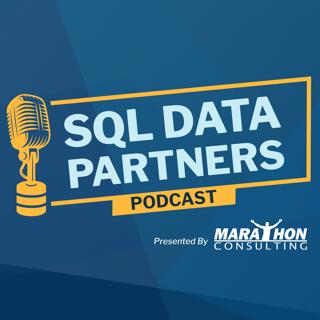
Episode 86 TsqlT
Based on listener feedback we got from episode 72, a request was made to have a conversation about testing frameworks and in this episode we are going to focus on tSQLt. We are pleased to have Sebastian Meine, the creator of the tSQLt unit testing framework, on the podcast with us. We talk about the basic principles of tSQLt Framework when it comes to unit testing. Sebastian will also be discussing about the do’s and don’ts as well as the different aspects to be considered when using the framework. Sebastian makes the case for why you should take the time to create unit tests and we discuss the challenges culture might play into the use of the framework. The shownotes for today’s episode is found at http://sqldatapartners.com/2017/03/03/episode-86-tsqlt/ and have fun on the SQL trail.
8 Mars 201743min

Episode 85 2016 Speedbumps
Have you done your migration to SQL Server 2016 yet? Don’t worry—you aren’t alone. With all the glory of new features and improved performance, not all upgrades are equal. In this episode we talk with Javier Villegas who returns from episode 2 to talk about some of the issues he ran into on the upgrade to 2016. He stumbled on a process that normally runs for 7 minutes prior to the upgrade and then 26 hours after the upgrade. While it all worked out, he shares the issues he had and gives us a reminder that testing has not been deprecated. The shownotes for today’s episode is found at http://sqldatapartners.com/2017/01/25/speedbumps/ and have fun on the SQL trail.
1 Mars 201739min

Episode 84 MVP
The Microsoft Most Valued Professional or MVP award--while it’s hard work and dedication to be called an MVP, what are the benefits? Well, Kathi Kellenberger is a great member of the SQL community, traveling to many SQL Saturdays, speaking at conferences about SQL server, and this time she is here with us to tell us what it really means to be an MVP and the great journey it has been to becoming one. Do you actually know the percentage between men and women MVPs in the world and US? How many posts do MVPs have on forums, helping others? How do they keep track of all the SQL Saturdays, User Groups, conferences they have been to? Kathi will be sharing her story, the process that she went through until she became an MVP, how you get nominated, and how to get renewed! The shownotes for today’s episode is found at http://sqldatapartners.com/2017/02/22/episode-84-mvp/ and have fun on the SQL trail.
22 Feb 201743min

Podcast 83 Data Visualizations
We’ve all been there – you have some data and you need to make it pretty for the report. With the all the new reporting options you have probably been tempted to find a new way to visually present information. In this episode of the podcast, we are talking about data visualizations and our guest, Jonathan Stewart, has some issues with the way we currently go about it. Jonathan has been on the show as a panelist and I have really enjoyed his perspective on things so we invited him on the program to discuss some ways you can go about improving the data visualization of your reports, without adding additional burden on process. Psychology plays a big role in data visualization. To make a good report, before even starting your tool, you should be able to summarize what the report presents. One of the major aspects of psychology is color and how we perceive it. Jonathan explains how we can use this while visualizing data. We discuss color blindness and I haven't heard this discussed too much elsewhere and I was curious to know how we can solve this problem with an easy button. The shownotes for today’s episode is found at http://sqldatapartners.com/2017/02/15/episode-83-data-visualizations/ and have fun on the SQL trail.
15 Feb 201750min

Episode 82 Indexes Part 2
In the previous episode we discussed the basics of using indexes, what they are, how to use them, along with some common problems and solutions. One of the problems you will certainly face as time passes is index fragmentation. While indexes will certainly help your database perform well, they do require care and feeding--meaning there is some administrative overhead. In this episode, we continue our conversation with Randolph West and discuss what we can do to take care of indexes and keep them well maintained over time. There is an option to use default maintenance plans and to do fragmentation and updating statistics, but should you use them? What are the alternatives? We didn’t forget to consider strategies for deciding which indexes to keep and which can be dropped. The shownotes for today’s episode is found at http://sqldatapartners.com/2017/02/08/episode-82-indexes-part-2/ and have fun on the SQL trail.
8 Feb 201743min

Episode 81 Indexes Part 1
Part of what we like to do on podcast is to present topics and discuss different ways you might use features. In this episode, we go back to basics and discuss indexes. Like most topics, we made sure to explain all the important aspects. Because this is a such broad topic, we decided to carry this over into our next episode as well. Using the phone book as an example, we chat with our guest Randolph West and explain heaps, non-clustered indexes, and clustered indexes. We also explain best practices to use them when creating new tables. We didn’t forget to cover the problems you might run into. For example, you might not think about indexes until your data grows very large. Sure, you can attempt to resolve the problem by moving to SSD’s and increasing memory, but this will push the issue further in the future. In this episode, we will discuss considerations for indexes and why database architecture is so important. We would like to hear your opinions. What are your strategies when using indexes? Use the hashtag #sqlpodcast and let us know! The shownotes for today’s episode is found at http://sqldatapartners.com/2017/02/01/episode-81/ and have fun on the SQL trail.
1 Feb 201744min

Episode 80 Containers
When was the last time you deployed code and then found an issue with the version of a stored procedure, a setting, or even a service pack? While we data folk don't generally have as much trouble with environment issues are our developer counterparts, it can still be a big deal. Spinning up a VM may not be such a big deal anymore; however, most of us still have to request one and wait. What if you could take care of the OS and the SQL Server and not worry about setting up another development environment? Our guest today is Andrew Pruski and he talks to us about how he is using containers to support his environments and the flexibility it provides to his and his co-workers. While the Linux containers seem to get lots of love, one unique thing about Andrew's setup is he is running Windows containers with older versions of SQL Server. What is cool to me is there are tools out there that can help us folks running windows get up and running without having to wait on our infrastructure to upgrade to Windows server 2016. If you are using containers, I would love to hear about it. Use the hastag #sqlpodcast and let us know! The shownotes for today’s episode is found at http://sqldatapartners.com/2017/01/24/sql-server-containers/ and have fun on the SQL trail.
25 Jan 201731min

Episode 79 SSIS Catalog
Although the SSIS Catalog DB is created with management studio, it does not behave like other databases. Our conversation in this episode revolves around the catalog, SSIS packages, and some of the complexities of migrating packages. Steve and I are excited to chat with our guest Andy Leonard about his thoughts on the catalog and how this feature provides some really interesting benefits for ETL architecture. The shownotes for today’s episode is found at http://sqldatapartners.com/2017/01/17/episode-79-ssis-catalog/ and have fun on the SQL trail.
18 Jan 201749min





















